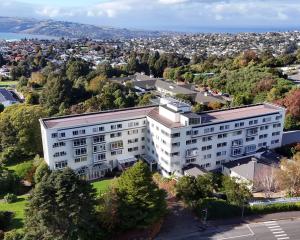
A plea to Treasury was turned down earlier this year. The South Dunedin Future initiative, run by the Dunedin City Council and Otago Regional Council, had asked for money for a progressive buy-out of at-risk properties.
Dunedin city councillor Sophie Barker welcomed the visit by Emergency Response Minister Mark Mitchell yesterday, but called for him to open the purse strings.
"Seeing it with his own eyes should be a big fat wake-up call to show us the money to fix our city. It is stressful, distressing and there are only going to be more weather bombs. There needs to be immediate and urgent action," Cr Barker said.
South Dunedin Community Network chairman Mike Hammond said his group was committed to working with South Dunedin Future and "at the end of the day there is a role for central government to help with funding options".
Attempts by the Otago Daily Times to get a government response to the funding calls were given the run-around yesterday.
Treasury was asked at 10.29am when there would be a fund for climate adaptation and responded at 3.01pm that the question was best answered by Finance Minister Nicola Willis. Ms Willis’ office bounced the query to Mr Mitchell’s office. Mr Mitchell’s office, at 4.42pm, bounced it to Climate Change Minister Simon Watts.
A spokesperson for Mr Watts said the minister could not respond by deadline, but the government was looking at a cross-party report on climate adaptation from the finance and expenditure select committee and "no policy commitments have been made yet".
In August, the Climate Change Commission delivered its first monitoring report gauging New Zealand’s adaptation progress and said it was not happening at the required scale or pace. The report featured a case study about South Dunedin and its community-led efforts to form a plan, but said there were concerns its adaptation could stall due to funding.

Climate Change Commission chairman Dr Rod Carr said yesterday spending on adaptation was important because "time is of the essence ... Delaying decisions will leave New Zealand with fewer choices and higher costs. Adaptation can provide great returns on investment that last a long time."
South Dunedin’s Labour MP, Ingrid Leary, praised the "stoicism and calm" of South Dunedin people during this week’s flooding and said the government had so far "scuppered" the community’s request for central funding.
"Not only does our region now urgently need emergency response funding for the cleanup, we urgently need our broken pipes fixed and a funded plan to respond to Dunedin’s water issues.
"Sadly, we are now forced to clean up once again instead of getting ahead of the curve."
Low-lying South Dunedin is flood-prone because it is a trapped sink, with no streams exiting to the ocean or harbour. The groundwater level is close to the surface and will continue to rise as sea levels rise and sand dunes erode.
The DCC said it would not comment on calls for a funded plan, or for pipes to be fixed, as it was focused on its flood response.












